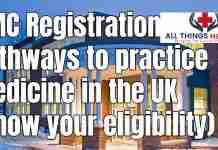Page Contents
Best tips for PLAB exam from an examiner
The best way for International medical graduates to gain access to clinical practice in the UK is to go for the Professional and linguistic assessments board (PLAB) test. this article will provide you with the best tips for PLAB exam from an examiner,
The test has two parts
Part 1 which is all about medical knowledge and is MCQs
Part 2 which is a practical clinical exam.
Here are some tips from a Plab part 2 examiner himself

Be yourself, not thinking of it as exam but a casual clinic day.
Suppose you have 18 consultations on your clinical list, take your time to look at your patient’s notes before each and maybe some test results to check too.
You could be examining a patient or maybe a relative. they may have come here for the first time. You may be asked to tell the management and advise you would give your patient considering his/her ongoing condition. you may be asked to speak to a relative patient about patient care.
no matter what they throw at you (to examine), you will be provided 8 minutes to complete each task and will be marked by the following observations
Domain 1 – Data gathering, technical and assessment skills:
this covers your history taking, physical examinations, practical procedures and investigations that lead to a diagnosis.
Domain 2 – Clinical management skills
this covers your proposed diagnosis, explaining the patient about the condition and formulating a management plan for him
Domain 3 – Interpersonal skills
this covers how you approach a station. the kind of bond you create with your patient, How you ask questions (open being the better ones always). Involving the patient in the condition they have and understanding what they say and finally proposing them with the management plan in a friendly ethical way.
Access sample station scenarios on the GMC’s website to practice your skills before taking the test.

Communication is the master key
One of the most countable factors that add to an individuals test marks is their communication skills. this typically comes down to their level of verbal English language. There is a requirement to demonstrate English language skills before taking the PLAB exam, however, some students pass that exam with high scores but are not as active when it comes to speaking the language or using the proper mixture of words.
You are struggling with understanding the patient’s language, cannot interpret what he tells you about his condition, furthermore cannot advise him/her properly about the management plan they should follow and the condition they are currently in, do you think you’ll be a good doctor? NO! the patient or the role player needs to understand what you are telling them as equally important for you to understand what they are telling you as most of the patients in the UK will of course talk in English. the examiners will observe this area strictly as a good doctor has good manipulating skills and manipulation comes from language and trust.
Sometimes the candidates use bookish phrases and sentences they have been taught, these catch the attention of the examiner within seconds as they know how genuine a sentence is and what is book reading. Those who use the same stock sentences over and over again are not embraced with better results so keep that in your mind too to be natural and friendly.
you have to create an emotional bond with the patient or the role player as they should think that you can feel their pain and would treat and advise them in the same way if it ever happened to you, such that every word you say is a mark on their heart and they trust you blindly. Care is of utmost importance, never show the patient that they are hopeless and helpless and such patients and scenarios are the most difficult for the candidates.
All the above-mentioned practices require you to have a strong grasp of verbal and nonverbal English language.
Take time understanding the task you are given
Do not hassle or erupt when the examination starts. take your time to read what task you have been given, understand it and start formulating the answer in your head. Think of how to approach the scenario and how to deal with it in terms of the domains mentioned above so be sure to do well according to all three.
Read the scenario, understand who you are and where you are and who is in front of you and what you have to do to get this done in the best way possible, know the patient, is he a relative? a worker? a depressed person? a wealthy person? his consultant or relative, know all about him/her. If the examiner gets a hint that you misunderstood the task, you will be asked to read it again and before that happens your score has already been deducted. Don’t panic, Do not panic.
Candidates do not understand the name of the patient in a hassle, Its very common, although it might look like a wrong name is not a big concern but it is, even fathers or guardians names are necessary because there may be two patients of the same name in a room then you can differentiate them from their parents or guardians name. A wrong name or incomplete name shows unprofessionalism and create a barrier between you and the patient.
Any changes made to the PLAB test, Be updated
In 2016, there were a number of changes to PLAB 2, they extended the number of scenarios from 14 to 18 and the time for each from 5 to 8 minutes. These caused problems for some candidates who had applied and then went underground to study and did not have any information about the exam from the outside world. The scenarios are more reflective of patient consultation, rather than asking a doctor to carry out the procedure. The examiners also have a stronger focus on the professional values and behaviors expected of the doctors who work across the UK, across both parts of the PLAB test.
In September 2017, they mentioned that candidates should pass part 2 within 2 years of passing PLAB 1. Some candidates lost their chance on part 2 for taking more time and not being updated. Even after passing both parts, doctors must have their application for registration with a license to practice approved within 2 years of passing.
Also from 2017, the candidates will have a maximum of 4 attempts at each part of the PLAB exam.
GMC also started a consultation with an approach to introduce a standard entry test for those wishing to practice medicine in the UK. It is called the medical licensing assessment (MLA).
The MLA is proposed to make a solo objective demonstration for doctors that aspire to enter the UK that they have met a common threshold for safe practice. It would give the government and public that doctors no matter where they are from have qualified on the same competitive level.
These were all PLAB tips coming from a PLAB part 2 examiner himself. That’s all about the best tips for PLAB exam from an examiner. If you wish to know more about PLAB click here.
In the meantime, I have compared
PLAB with AMC for you too if you want to take a look at it as AMC is the Australian medical council exam for practicing medicine in Australia.




![1000 EMQs For PLAB 3rd Edition PDF Free Download [Direct Link] 1000-emqs-for-plab-3rd-edition-pdf](https://allthingsmedicine.com/wp-content/uploads/2019/12/1000-emqs-for-plab-3rd-edition-pdf-1-1-218x150.jpg)






![1000 EMQs For PLAB 3rd Edition PDF Free Download [Direct Link] 1000-emqs-for-plab-3rd-edition-pdf](https://allthingsmedicine.com/wp-content/uploads/2019/12/1000-emqs-for-plab-3rd-edition-pdf-1-1-100x70.jpg)

